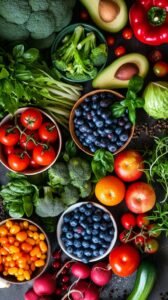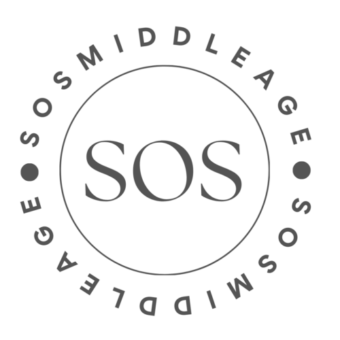Table of Contents
ToggleAre you suffering Menopausal Hair Loss? Don’t worry—you’re not powerless in this situation! By understanding how nutrition impacts hair health.
Menopause is a significant phase in a woman’s life, often bringing along some surprising changes, including hair loss. You can make choices that nourish both your body and your hair from the inside out. Let’s dive into how a well-rounded diet can help you keep your hair looking fabulous during menopause.
The Connection Between Nutrition and Menopausal Hair Loss
Your hair is a dynamic, living part of your body, and just like any other part, it requires the right nutrients to stay vibrant and healthy. The hair growth cycle includes three stages:
1. Anagen (the growth phase), 2. Catagen (the transition phase), and 3. Telogen (the resting phase). As menopause approaches, hormonal shifts—especially a decline in estrogen—can throw this cycle off balance, leading to thinning and hair loss. This is where good nutrition comes into play; it’s vital for revitalizing the hair growth cycle and countering the effects of menopause on your hair.
When you’re lacking certain nutrients, it can directly affect the health of your hair, making it weak and more likely to fall out. For example, not getting enough iron can trigger telogen effluvium, a common type of hair loss in women. By focusing on a diet rich in essential vitamins, minerals, and proteins, you can help support your hair’s structure and growth.
Key Nutrients for Gorgeous Hair Growth
If you want to fight against menopausal hair loss, pay special attention to these crucial nutrients that promote both growth and strength:
1. Protein-Packed Foods
Protein is a key building block for your hair, primarily made of a protein called keratin. If your diet lacks sufficient protein, your body might prioritize other vital functions over hair production, resulting in thinning or hair-loss. Here’s how protein can benefit your hair:
- Strengthens Hair Structure: Protein reinforces the hair shaft, helping to prevent breakage.
- Promotes Growth: Getting enough protein ensures that your body has what it needs to create new hair cells.
Look for high-quality protein sources such as:
- Lean meats: Chicken, turkey, and beef are fantastic sources, loaded with essential amino acids that your body can’t produce on its own.
- Fish: Varieties like salmon and mackerel provide both omega-3 fatty acids and protein—great for hair health!
- Eggs: A nutritional powerhouse, eggs are rich in protein, biotin, and other essential nutrients for hair.
- Legumes: Beans, lentils, and chickpeas are excellent plant-based protein choices, especially for vegetarians and vegans.
Try to aim for 50-75 grams of protein daily, adjusting based on your activity level and body weight. Consistent protein intake is essential for maintaining strong, healthy hair.
 2. Vitamins and Minerals
2. Vitamins and Minerals
Vitamins and minerals are critical for supporting various functions tied to hair health, from collagen production to nutrient absorption. Here are some important ones to keep an eye on:
- Vitamin A: This vitamin is vital for creating sebum, the natural oil that keeps your scalp hydrated and hair healthy. Without enough vitamin A, you might end up with a dry, flaky scalp and lackluster hair. Good sources include carrots, sweet potatoes, and spinach.
- B-vitamins: The B-vitamin family, particularly biotin (B7), is renowned for promoting hair growth. Biotin strengthens hair and aids in keratin production. Other B-vitamins, such as B12 and folic acid, help generate red blood cells, which transport oxygen and nutrients to your scalp and hair follicles. Incorporate foods like whole grains, eggs, and avocados for a B-vitamin boost.
- Vitamin C: This powerful antioxidant assists your body in producing collagen, a vital component of hair structure. Plus, vitamin C enhances iron absorption, which is crucial for preventing anemia—often linked to hair loss. Look for sources like citrus fruits, strawberries, and bell peppers.
- Vitamin D: While it’s widely recognized for its role in bone health, vitamin D is also key for hair follicle cycling. A deficiency might contribute to hair loss. Besides sunlight, you can obtain vitamin D from fatty fish, fortified dairy products, and eggs.
- Iron: Iron deficiency is one of the leading causes of hair loss, particularly among women. It helps red blood cells deliver oxygen to various cells, including those that stimulate hair growth. You can find iron in red meat, spinach, lentils, and fortified cereals. Pairing iron-rich foods with vitamin C-rich options can boost absorption.
- Zinc: This mineral is essential for protein synthesis and cell division, both crucial for hair growth. Zinc also helps maintain the oil glands around hair follicles, reducing the risk of hair loss. Good sources of zinc include nuts, seeds, and whole grains.
3. Omega-3 Fatty Acids
Omega-3 fatty acids are vital for scalp health, helping to reduce inflammation that can hinder hair growth. They also keep your hair shiny and vibrant. You can find omega-3s in:
- Fatty fish: Salmon, mackerel, and sardines are excellent sources, offering both omega-3s and high-quality protein.
- Flaxseeds and chia seeds: These plant-based omega-3 sources are fantastic additions to smoothies, oatmeal, or salads.
- Walnuts: Packed with omega-3s and vitamin E, walnuts help protect your hair from sun damage.
Aim for about 1,000 mg of omega-3 fatty acids daily, adjusting based on your personal dietary needs.
Foods to Skip for Optimal Hair Health
While it’s vital to focus on nutrient-rich foods, it’s just as essential to be aware of foods that could harm your hair health:
- High-glycemic index foods: Foods like white bread, sugary snacks, and pastries can cause spikes in blood sugar, which in turn can lead to increased insulin production. This fluctuation may affect hormone levels and worsen menopausal symptoms like hair loss.
- Processed foods: These often come laden with preservatives, unhealthy fats, and low-quality ingredients that provide little nutritional benefit for your hair. Overindulgence in processed foods can rob your hair of the essential nutrients it needs to thrive.
- Excessive caffeine: While a morning coffee can be enjoyable, too much caffeine can interfere with the absorption of crucial minerals like iron and zinc, both important for hair growth. Keeping your intake to one or two cups daily can help strike a balance between enjoying coffee and caring for your hair.
Meal Planning for Hair Health
Being mindful of your meals can make a significant difference in ensuring you get the nutrients needed to combat menopausal hair loss.
Here’s a sample meal plan for a day:
- Breakfast: Kick off your day with a nutrient-dense smoothie made of Greek yogurt (for protein and probiotics), spinach (for iron and vitamin C), a handful of berries (antioxidants and vitamin C), and a tablespoon of flaxseeds (omega-3s).
- Lunch: Treat yourself to a salad with grilled chicken (protein), mixed greens (vitamins A and C), avocado (healthy fats), and quinoa (complete protein and fiber). Drizzle with a lemon vinaigrette for an extra boost of vitamin C.
- Dinner: Go for baked salmon (rich in omega-3s and protein) alongside steamed broccoli (loaded with vitamin C) and sweet potatoes (full of vitamin A). This meal provides a wealth of nutrients beneficial for hair health.
Snacks: Keep your energy up with nutritious snacks like a boiled egg (protein and biotin), a handful of almonds (zinc and vitamin E), or a small cup of yogurt sprinkled with chia seeds (omega-3s).
Incorporating hair-friendly foods into your everyday diet isn’t as challenging as it may seem. A little planning can lead to significant support for your hair’s health during menopause.
Supplements: Are They Effective?
While a diet rich in nutrients is your best ally for hair health, supplements can sometimes offer an extra boost—particularly if you have specific deficiencies. Let’s take a look at some popular supplements for hair growth:
- Biotin: Renowned for its support of hair and nail health, biotin is often suggested to aid in hair growth. While most individuals get enough biotin from their diets, supplementation might benefit those with certain deficiencies.
- Collagen: Collagen supplements have gained popularity for promoting hair health, as collagen is a fundamental part of hair’s structure. Although more research is needed, some studies suggest that collagen may enhance hair thickness and strength.
- Multivitamins: Taking a well-rounded multivitamin can ensure you’re receiving sufficient amounts of vital vitamins and minerals that bolster hair growth, particularly if your diet falls short.
However, it’s important to remember that supplements shouldn’t replace a balanced diet. Always consult with a healthcare professional before beginning any supplement regimen, as some can interact with medications or lead to unwanted side effects. While scientific evidence supports the efficacy of certain supplements, the best approach is always one tailored to your unique health needs.
Staying Hydrated for Healthy Hair
Hydration is often overlooked in discussions about hair care, but it’s crucial for keeping your hair strong and radiant. Water makes up about 25% of a hair strand’s weight, and without enough hydration, your hair can become dry, brittle, and more prone to breaking.
Dehydration can also impact scalp health, leading to issues like dandruff and slower hair growth. To maintain optimal hair health, it’s essential to drink enough water throughout the day.
By adopting a thoughtful approach to your diet and hydration, you can empower yourself to combat menopausal hair loss and embrace this transformative time with confidence!
The Connection Between Gut Health and Hair Growth
Your gut health affects how well your body absorbs the nutrients that your hair needs. To keep your gut happy:
- Eat probiotic-rich foods like yogurt, kefir, and sauerkraut.
- Include prebiotic foods like garlic, onions, and bananas to nourish your gut bacteria.
- Make sure to get enough fiber from fruits, vegetables, and whole grains.
A healthy gut means better nutrient absorption and healthier hair!






























